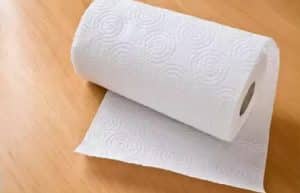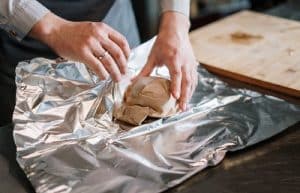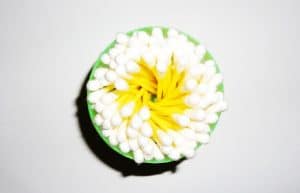Here’s a scary fact: the average American creates 4.5 pounds of trash daily. That’s a lot of waste! While it may seem daunting, there are plenty of ways to reduce waste production—starting with cutting out disposable items from your life. Here are some disposable items you should stop buying to help you live zero-waste.
Table of Contents
1. Paper Towels

Paper towels are among the most commonly used disposable products, but they are also among the biggest waste offenders. Each year, billions of pounds of paper towel waste end up in landfills, where they decompose and release methane gas, a potent greenhouse gas.
Even if you recycle your paper towels, they have a significant environmental impact.
The trees cut down to make paper towels require large amounts of water and energy, and the manufacturing process releases harmful chemicals into the air.
2. Live Zero-waste with Toothpicks
If you’re trying to live a zero-waste life, toothpicks are one disposable product you should avoid. Toothpicks are made from wood, which means they come from trees.
Trees are essential to the environment and help combat climate change by absorbing carbon dioxide. But unfortunately, when you use a toothpick, you’re contributing to the destruction of trees.
In addition, toothpicks are usually wrapped in plastic, which means they’ll end up in a landfill where they’ll take hundreds of years to decompose.
3. Wrapping Paper

If you want to live a more eco-friendly and zero-waste life, wrapping paper is one disposable product you should avoid. Though it may seem like a small change, wrapping paper creates a lot of waste.
Not only is it often used for just a single occasion before being thrown away, but it’s also made from non-recyclable or low-quality materials. As a result, it ends up in landfills, where it will take years to decompose.
Use reusable materials like cloth or bags if you need to wrap a gift. Not only will this help reduce waste, but it can also be much more stylish and unique.
4. Live Zero-waste with your Napkins and Facial Tissues
Chances are, you use napkins and facial tissues daily. But have you ever considered where they come from? Most disposable napkins and facial tissues are made from virgin tree pulp, meaning they come from trees cut down precisely for the paper industry.
Not only is this bad for the environment, but it also requires a lot of energy and water. Moreover, these products are often packaged in plastic, which means they end up in landfills, where they take centuries to decompose.
If you want to live a zero-waste life, you can ditch disposable napkins and facial tissues in favor of reusable alternatives. Cloth napkins can be washed and reused, and bamboo or cotton towels can be used instead of paper towels.
This is not only better for the environment, but it can also save you money in the long run.
5. Live Zero-waste with your Tooth Paste
Toothpaste is one of those things we use daily, but have you ever stopped thinking about how eco-friendly it is? Unfortunately, most toothpastes come in plastic tubes that can’t be recycled and often contain harmful chemicals that can end up in our waterways.
Manufacturing toothpaste requires a lot of energy and water. So, if you’re looking to live a zero-waste life, toothpaste is one disposable product you should avoid.
Plenty of eco-friendly alternatives out there will do just as good of a job at keeping your teeth clean.
So, ditch the toothpaste and opt for a more sustainable option next time you’re at the store.
6. Newspapers

While most people don’t think twice about grabbing a paper on their way to work, the newspaper industry is incredibly damaging to the environment. Paper production uses a lot of water and energy, generating pollution.
In addition, most newspapers are printed on non-recycled paper, meaning they end up in landfills where they release harmful chemicals into the ground.
Finally, newspaper delivery creates significant traffic, which contributes to air pollution. Considering all these factors, it’s easy to see why buying a newspaper is not ecofriendly.
If you want to live a zero-waste life, ditch the paper and opt for digital news instead.
7. Single Body Wash to Live Zero-waste
These little bottles end up in landfills, which take centuries to decompose. The packaging is usually made from plastic, a major contributor to environmental pollution.
If you want to live a zero-waste life, say goodbye to single-use body wash and switch to bar soap instead. Bar soaps are as effective as their liquid counterparts but are much more sustainable.
They’re usually made from all-natural ingredients and come without any packaging. Plus, they last much longer than single-use body wash, so you’ll save money in the long run.
So ditch the disposables and switch to bar soap for a more sustainable lifestyle.
8. Plastic Wraps
There’s no doubt that plastic wrap is incredibly convenient. It’s great for keeping food fresh, thin, and lightweight, so it doesn’t take up much space in the fridge or cupboard.
However, plastic wrap is also one of the most problematic disposable products. It’s made from non-renewable petroleum-based materials that release harmful greenhouse gases when produced.
Furthermore, plastic wrap is rarely recycled, meaning most of it is in a landfill. So, ditching plastic wrap is an excellent place to start if you’re trying to live a zero-waste life.
9. Aluminum Foil impact to Live Zero-waste

If you want to reduce your disposable plastic consumption, you should consider giving up aluminium foil. Not only is it difficult to recycle, but it’s also a significant source of greenhouse gas emissions.
Aluminium foil production generates about 2% of the world’s annual greenhouse gas emissions. So, if you’re serious about living a zero-waste life, it’s time to ditch the aluminium foil and find eco-friendly alternatives.
Many reusable options are on the market, from silicone food wraps to beeswax cloths. So, you’ll not only be doing your part to reduce your environmental impact but also saving money in the long run.
10. Kitchen Sponge
If you’re committed to living a zero-waste life, you need to stop buying some disposable products. One of these is the kitchen sponge. Unfortunately, most kitchen sponges are made from plastic, which means they’ll sit in a landfill for hundreds of years.
They’re often treated with chemicals like Triclosan, which can harm humans and the environment. Ditch the sponge to make your kitchen more eco-friendly, and choose a more sustainable option like a dish brush or washcloth.
With some care, these products can last for years, saving you money and helping the environment.
11. Reduce Plastic Bags to Live Zero-waste
Have you ever considered how many plastic bags you use in a year? Or how long it takes them to decompose? If you’re like most people, you’ll probably say no. After all, plastic bags are so convenient – they’re lightweight, strong, and easy to carry.
Plus, they’re cheap, so we often use them without a second thought. But the truth is that plastic bags are incredibly harmful to the environment. They are made from fossil fuels that contribute to climate change and take centuries to decompose.
Even worse, they frequently end up in our oceans, killing marine life.
12. Cotton Ear Buds

If you’re trying to live a zero-waste life, one disposable product you should stop buying is cotton earbuds. Unlike other recyclable materials, cotton earbuds can’t be recycled and end up in landfills, which take years to decompose.
In addition, producing cotton earbuds requires using pesticides and other chemicals that can harm the environment. If you’re looking for a more eco-friendly option, consider using reusable earbuds made from sustainable materials such as bamboo.
Not only are they better for the environment, but they’re also just as effective at cleaning your ears as cotton earbuds.
13. Plastic Toothbrush
There are many disposable products out there that can be replaced with more sustainable alternatives. One example is plastic toothbrushes. Every year, billions of plastic toothbrushes end up in landfills, taking hundreds of years to decompose.
Not only that, but the production of plastic toothbrushes requires fossil fuels and emits harmful greenhouse gases. Luckily, plenty of sustainable alternatives exist, including toothbrushes made from bamboo or recycled plastics.
Switching to a sustainable toothbrush is an easy way to reduce environmental impact and live a more zero-waste lifestyle.
